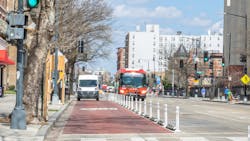WMATA, DDOT partner on Clear Lanes initiative to speed bus movement
The Washington Metropolitan Area Transit Authority (WMATA) Board of Directors approved the Clear Lanes initiative, which will see WMATA partner with the District of Columbia Department of Transportation (DDOT) to use automated camera technology mounted on Metrobuses to enforce bus stop zones and bus-only lanes. The initiative is modeled after existing program in New York City and San Francisco.
WMATA says 140 buses on 31 routes that run on bus-only lanes will be equipped with cameras and violations captured with encrypted video and photos will be sent directly to DDOT. WMATA will not be able to access or review the video footage. The review of the footage, issuing of citations and fine collection will all be handled by DDOT. WMATA will not receive funds from the fines collected.
WMATA reports the average speed of Metrobuses within the district was 9.8 miles per hour in 2022, a number that has been decreasing for 15 years. The authority explains slowing bus speeds prohibits the service’s ability to be competitive.
"For people to use buses, we need them to be faster and more reliable. That can't happen if cars are blocking the bus lanes that are supposed to keep buses moving," said WMATA General Manager and Chief Executive Officer Randy Clarke. "Bus stop zones are equally important to keep clear, so buses can pull up to the curb, so customers of all abilities have a safe way to board or exit."
The technology supports WMATA’s Better Bus initiative aimed at creating better, more reliable bus service. WMATA says nearly half of all customers on Clear Lanes routes are low-income, and 80 percent are persons of color. The program is expected to improve service for about two out of every three Metrobus customers in the district, the majority of whom do not own a car.
"We are investing more than $100 million in our Bus Priority Program, building a network of bus lanes that will create a more equitable, better quality of life for people across the district," said DDOT Director Everett Lott. "Over the next six years, our vision is to have 120-lane miles of bus-only lanes that connect our neighborhoods and bring people to jobs, kids to schools and families together."
Funding Clear Lanes
WMATA will spend $4.6 million over the first two years of the program to purchase, install and maintain the cameras. DDOT will spend an estimated $3.1 million to cover operating costs, including the annual licensing and software fees during the first two years.
Procuring the system has been completed with WMATA signing a contract with Hayden AI to deploy its AI-powered, bus-mounted camera systems. The initial 140 systems will be installed during the summer and fully operational by the end of 2023. The contract includes options to expand the program to 600 cameras over a 10-year period.
“We are honored to work with Metro to bring automated bus lane and bus stop enforcement to our nation’s capital,” said Chris Carson, CEO and co-founder of Hayden AI. “Keeping bus lanes clear of illegally parked vehicles improves transit speeds and safety for riders and making sure bus stops aren’t used as parking spots will guarantee that riding the bus is accessible for all riders, including people with disabilities.”
Hayden AI reports use of its system has increased compliance with dedicated bus lane stopping and parking restrictions, with Metropolitan Transportation Authority finding 86 percent of drivers who receive a bus lane parking violation do not receive another.
WMATA anticipates improvements in bus service will be seen after three months of the system being active. While Clear Lanes is currently planned for roll out in the district, WMATA says it is exploring the possibility to expand the program, which would require additional legislation before similar programs could be implemented in Maryland and Virginia.

Mischa Wanek-Libman | Group Editorial Director
Mischa Wanek-Libman is director of communications with Transdev North America. She has more than 20 years of experience working in the transportation industry covering construction projects, engineering challenges, transit and rail operations and best practices.
Wanek-Libman has held top editorial positions at freight rail and public transportation business-to-business publications including as editor-in-chief and editorial director of Mass Transit from 2018-2024. She has been recognized for editorial excellence through her individual work, as well as for collaborative content.
She is an active member of the American Public Transportation Association's Marketing and Communications Committee and served 14 years as a Board Observer on the National Railroad Construction and Maintenance Association (NRC) Board of Directors.
She is a graduate of Drake University in Des Moines, Iowa, where she earned a Bachelor of Arts degree in Journalism and Mass Communication.





